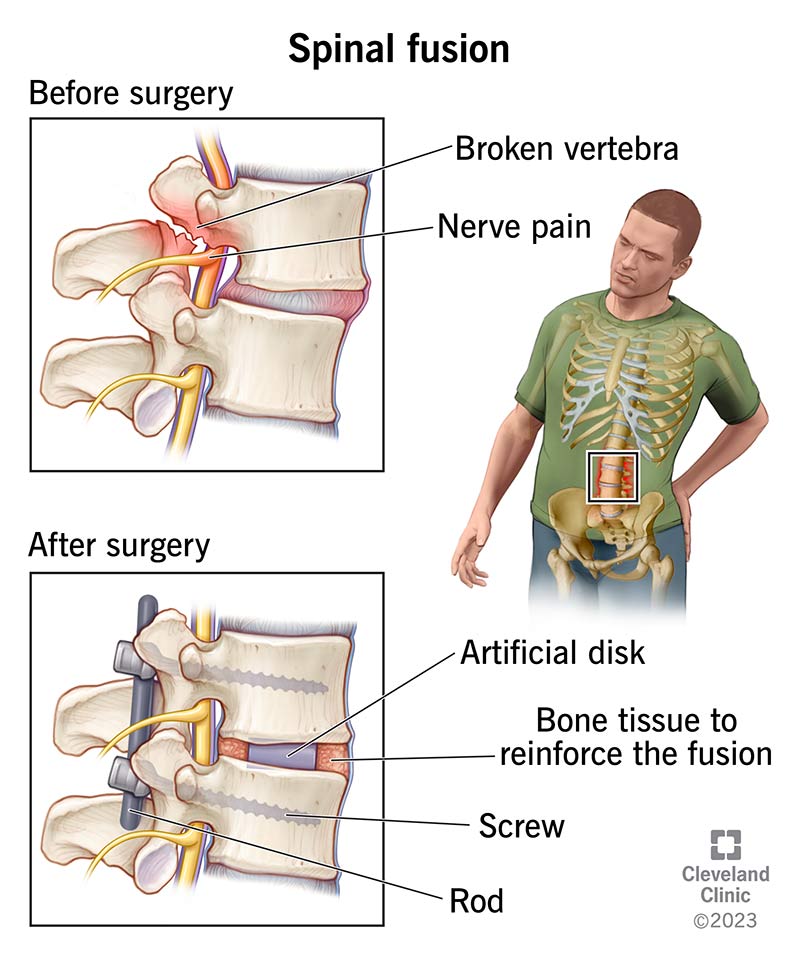Spinal Cord Surgery
Spinal cord surgery is a critical procedure aimed at addressing issues related to spinal cord injuries, diseases, or degenerative conditions. These surgeries aim to restore function, relieve pain, and improve the quality of life for patients suffering from spinal conditions. Spinal cord injuries can result from trauma, degenerative diseases, or congenital conditions, leading to symptoms such as paralysis, loss of sensation, or severe pain.
Who Needs Spinal Cord Surgery?
Spinal cord surgery is recommended for patients who meet the following criteria:
- Suffering from spinal cord injuries or diseases causing severe pain or paralysis.
- Experiencing progressive neurological deficits such as weakness, loss of sensation, or inability to move.
- Having herniated discs, spinal stenosis, or tumors that compress the spinal cord or nerve roots.
- Conditions like scoliosis or spinal deformities causing functional impairment or discomfort.
- Patients with fractures, infections, or diseases affecting the spine that require surgical intervention.
Symptoms of Spinal Cord Conditions
Spinal cord-related conditions can manifest through a range of symptoms, which can vary depending on the location and severity of the injury or disease. Common symptoms include:
- Paralysis or Weakness in the Limbs: This may manifest as paraplegia (paralysis of the lower body) or quadriplegia (paralysis of all four limbs), depending on the area of the spinal cord affected.
- Numbness or Tingling Sensations: Individuals may experience abnormal sensations, such as numbness or a "pins and needles" feeling, particularly in the hands, feet, arms, or legs.
- Severe Back or Neck Pain: Chronic or sudden pain in the back or neck can radiate down to the arms or legs. This pain is often severe and may be accompanied by muscle tension or spasms.
- Difficulty in Walking or Maintaining Balance: Due to weakness, numbness, or coordination issues, individuals may struggle to walk or maintain balance, increasing the risk of falls.
- Loss of Bladder or Bowel Control: Spinal cord conditions can disrupt the nerves that control bladder and bowel function, leading to incontinence or difficulty with urination and defecation.
- Muscle Spasticity or Rigidity: Individuals may experience involuntary muscle contractions or stiff, rigid muscles, often making it difficult to move or perform everyday activities.
- Impaired Coordination or Fine Motor Skills: Damage to the spinal cord can affect fine motor skills, such as the ability to button clothes, write, or perform other tasks that require precision and coordination.
Causes of Spinal Cord Disorders
Spinal cord disorders can be caused by a variety of factors, including:
- Trauma/Injury: Accidents, falls, or sports injuries can lead to spinal cord injuries.
- Degenerative Diseases: Conditions such as spinal arthritis or disc degeneration can compress nerves or the spinal cord.
- Infections: Infections like meningitis or abscesses can affect the spinal cord.
- Tumors: Both malignant and benign tumors can cause spinal cord compression.
- Congenital Defects: Conditions like spina bifida may require surgical intervention.
- Vascular Problems: Blood flow issues, such as strokes or aneurysms, may also affect the spinal cord.
- Infections or Inflammation: Diseases like tuberculosis or multiple sclerosis can damage the spinal cord.
Key Benefits of Spinal Cord Surgery
- Pain Relief: Surgical treatment helps alleviate chronic pain caused by nerve compression, herniated discs, or other conditions.
- Restored Function: In some cases, surgery can help restore lost motor or sensory function, improving mobility and quality of life.
- Prevention of Paralysis: Early intervention can prevent further spinal damage and paralysis in cases of spinal cord injury.
- Improved Quality of Life: Many patients experience a significant improvement in their daily activities and overall well-being after surgery.
- Minimally Invasive Options: Some spinal surgeries are performed with minimally invasive techniques, leading to quicker recovery times and smaller incisions.
The Spinal Cord Surgery Process
Spinal cord surgery is typically performed using various techniques, depending on the specific condition. The procedure is often minimally invasive but may vary in complexity:
Initial Assessment & Evaluation:
A comprehensive evaluation by a spine surgeon and neurologist is conducted to assess the patient's condition. This includes reviewing medical history, conducting physical exams, and obtaining imaging studies (MRI, CT scans, or X-rays).
Pre-Surgical Preparation:
Before the surgery, additional tests may be done, including blood work, heart monitoring, and a neurological assessment to ensure the patient is fit for surgery.
Surgical Procedure:
Spinal cord surgery can involve:
- Spinal Fusion: Joining two or more vertebrae to stabilize the spine.
- Discectomy: Removal of herniated or damaged discs.
- Laminectomy: Removal of part of the vertebra to relieve pressure on the spinal cord.
- Tumor Removal: Excision of tumors affecting the spine or spinal cord.
- Decompression: Relieving pressure from nerves or the spinal cord due to conditions like stenosis.
Post-Surgery Recovery & Rehabilitation:
Recovery depends on the type and complexity of the surgery. Patients will be monitored in the hospital for a few days. Physical therapy is often necessary to aid in mobility and recovery.
Ongoing Monitoring & Adjustments:
Patients are advised to attend follow-up appointments to assess recovery progress. In some cases, adjustments may be made to the surgical approach or ongoing rehabilitation plans.
Step-by-Step Process for Spinal Cord Surgery
- Initial Consultation & Assessment: The first step involves an in-depth consultation with a spine specialist to review the patient's medical history, symptoms, and imaging results. The surgeon will recommend the best approach for surgery.
- Pre-Surgical Preparation: Patients undergo necessary pre-operative tests to ensure safety during surgery. This may include blood tests, heart monitoring, and neurological evaluations.
- Surgical Procedure: The surgery is performed under general anesthesia, and the appropriate surgical approach is chosen based on the patient's condition. The procedure may involve discectomy, spinal fusion, or decompression surgery.
- Post-Surgery Recovery & Rehabilitation: After surgery, patients will be monitored in the hospital. Rehabilitation, including physical therapy, is often necessary to help regain strength and mobility.
Ongoing Monitoring & Adjustments: Regular follow-ups are essential for monitoring the progress of recovery. In some cases, further interventions may be required to optimize results.
Why Choose Healtour Solutions for Spinal Cord Surgery?
- World-Class Facilities: We connect you with top hospitals and advanced medical centers in India that specialize in spinal cord surgery.
- Experienced Specialists: Our network includes leading spinal surgeons and neurologists with years of experience in treating spinal conditions.
- Affordable and High-Quality Treatment: Spinal cord surgery in India offers exceptional care at a fraction of the cost compared to Western countries.
- Comprehensive Care: From initial consultation to post-surgical rehabilitation, we provide holistic care and support throughout your treatment journey.
- Customized Treatment Plans: Each treatment plan is personalized to address the patient’s specific condition and needs.
10 Frequently Asked Questions (FAQs)
- What is Spinal Cord Surgery? Spinal cord surgery involves procedures to treat conditions such as injuries, tumors, or degenerative diseases affecting the spine and spinal cord.
- How effective is Spinal Cord Surgery? Spinal cord surgery can effectively relieve pain, improve mobility, and prevent further neurological damage. The results depend on the severity of the condition.
- Who is a candidate for Spinal Cord Surgery? Candidates include patients with spinal cord injuries, herniated discs, spinal tumors, or other conditions that cause pain, paralysis, or neurological deficits.
- Is Spinal Cord Surgery safe? While spinal cord surgery carries some risks, it is generally safe. Risks include infection, bleeding, and nerve damage, but these are rare.
- What is the recovery time after Spinal Cord Surgery? Recovery varies depending on the surgery type, but most patients can resume light activities within a few weeks. Physical therapy is essential for a full recovery.
- How long does the effect of the surgery last? The results of spinal surgery can be long-lasting, though patients may require ongoing therapy or follow-up surgeries in some cases.
- Will I need physical therapy after surgery? Yes, physical therapy is often recommended to improve strength, mobility, and function post-surgery.
- Can Spinal Cord Surgery restore lost function? In some cases, spinal cord surgery can restore lost function, particularly in patients with injuries or nerve compression. Results vary.
- Is Spinal Cord Surgery covered by insurance? Most insurance plans cover spinal cord surgery, but you should verify with your provider for specific coverage details.
How do I get started with Spinal Cord Surgery through Healtour Solutions? Contact Healtour Solutions to schedule an initial consultation with one of our expert spinal surgeons and begin your journey toward effective treatment.



